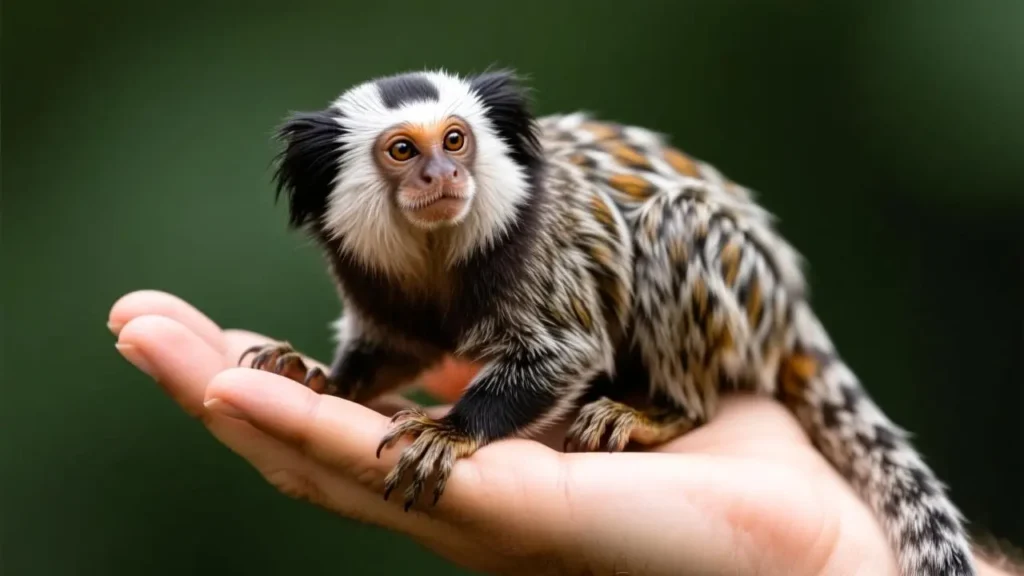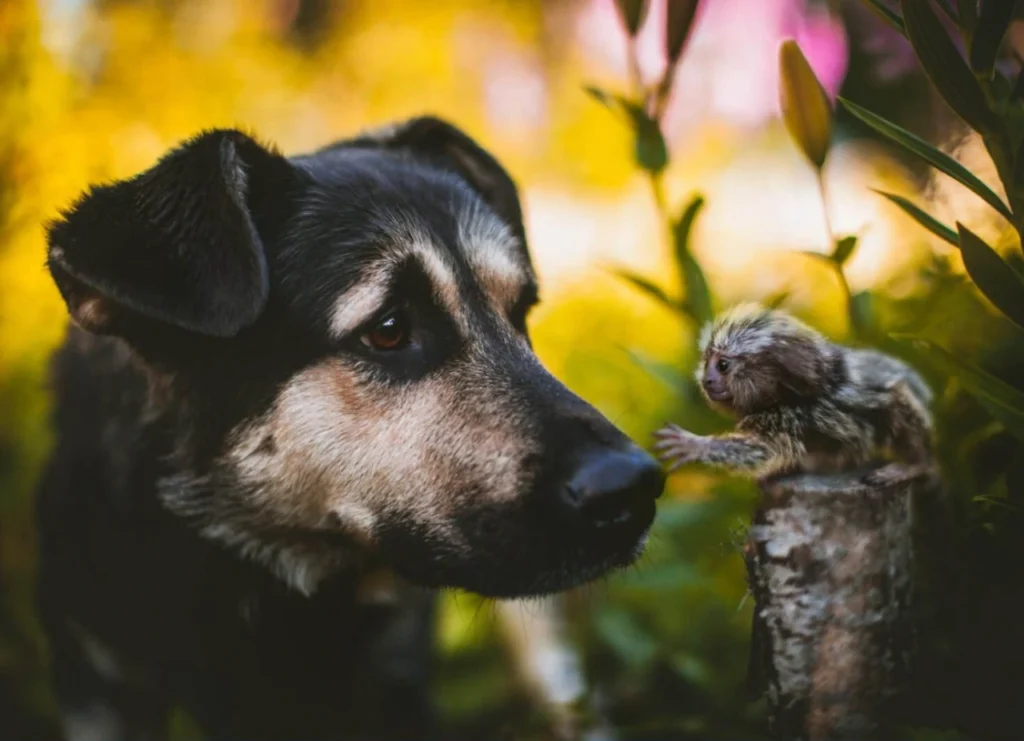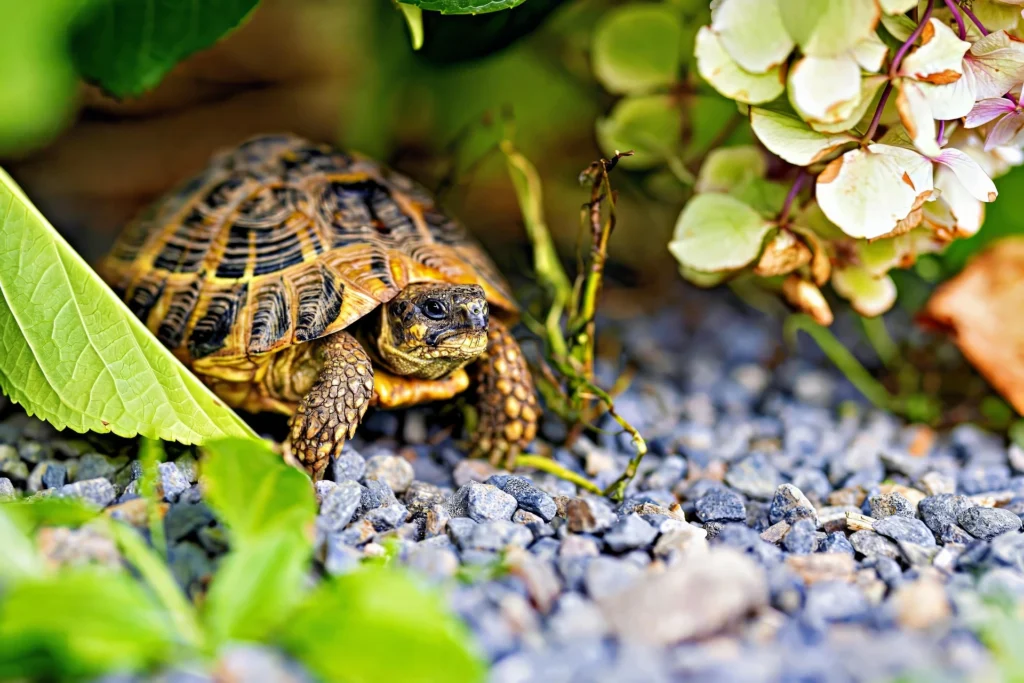Wondering if you should keep a marmoset as a pet? The short answer is maybe—but only if you’re truly willing to go the extra mile. Marmosets are high-maintenance, need expert care, and are only legal in certain regions. This comprehensive guide will explore all aspects of owning a marmoset monkey as a pet, from their care needs to their suitability as household companions.
We’ll cover popular questions like, “Are marmosets good pets?” and “What is the life expectancy of a marmoset monkey?” We’ll also review practical information such as the “marmoset monkey pet price,” “how to take care of marmosets,” and whether they can get along with other pets. By the end of this article, you’ll have a clear understanding of whether a marmoset monkey—or even its smaller relative, the pygmy marmoset—is the right choice for your family.
What Are Marmoset Monkeys?
A marmoset monkey belongs to the family Callitrichidae, a group of tiny primates native to Central and South America. These monkeys are most notable for their small size, with adult marmosets generally reaching about 8 inches in length (excluding their tails) and weighing just around 300-500 grams. If you’re interested in learning about other New World primates, you can also check out our article about spider monkeys.
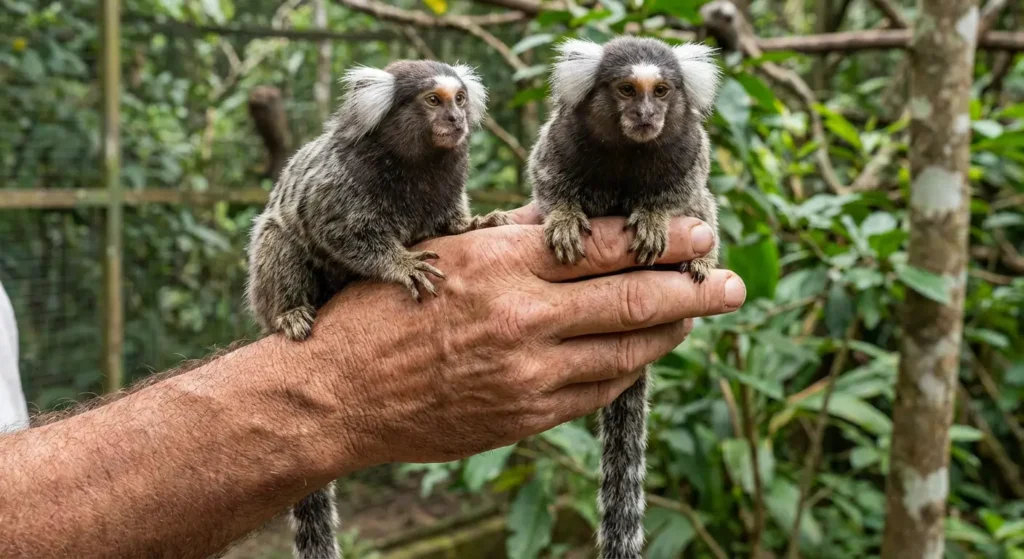
Pygmy Marmoset as a Pet
One of the most famous species of marmosets is the pygmy marmoset, often marketed as a “finger monkey.” It’s particularly popular as an exotic pet due to its tiny size and adorable appearance. Despite their small stature, these primates have care needs just as intensive as larger marmosets. They require specialized housing, a carefully balanced diet, daily social interaction, and regular veterinary attention to stay healthy and happy in captivity.
Is It Legal to Have a Marmoset as a Pet?
Owning a marmoset as a pet in the United States is sometimes legal, but the laws vary widely depending on the state and even your local county. There is no federal law that completely bans private primate ownership, but federal regulations do restrict the importation of primates and require certain breeders and dealers to be licensed. Some states allow marmosets without a permit, others require special licensing, and several ban primate ownership altogether. Even in states where owning a marmoset is legal, local ordinances may have additional restrictions you must follow. Because the legal landscape is so fragmented, it’s essential to check both state and local laws before considering a marmoset as a pet.
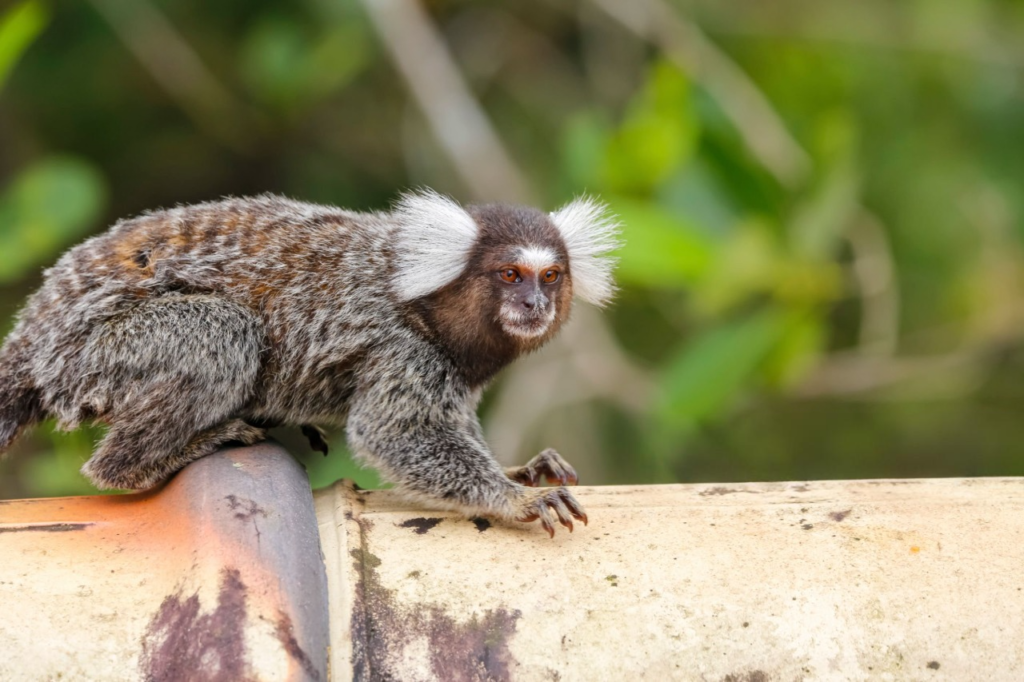
Marmoset Monkey Behavior and Suitability for Families
Marmoset monkeys may look cute and tiny, but their natural behavior makes them far more demanding than most people expect. In the wild, marmosets live in tight family groups, spend their days climbing, foraging, and grooming each other, and rely heavily on constant social interaction. They’re naturally territorial and communicate through high-pitched calls, scent marking, and expressive body language. This strong group dependence and energetic lifestyle don’t disappear in captivity if anything, they become harder to manage.
In home settings, marmosets tend to bond intensely with one single person and may become jealous or aggressive toward others. Their moods can shift quickly, especially when stressed, bored, or overwhelmed by noise. Even with dedicated care, biting and territorial behavior are very common. They also mark their space with urine and scent glands, chew objects, and require hours of enrichment and interaction every day.
Because of this, marmosets generally aren’t suitable for families with children or households that include other pets. Kids can easily startle them, and a scared or overstimulated marmoset may respond by scratching or biting. Dogs and cats also pose risks—either as predators or as sources of constant stress. Even when raised from a young age, marmosets remain instinct-driven, sensitive, and difficult to manage in busy homes.
Overall, while they’re fascinating primates, their natural temperament and complex needs make them a poor fit for most families. They thrive best in environments designed specifically for primates, not typical household settings.

Housing and Habitat Needs for a Marmoset Monkey as a Pet
Providing proper housing for a marmoset monkey as a pet is far more complex than most people imagine. Even though they’re often marketed as the smallest monkey pet or an easy “starter primate,” marmosets have extremely demanding environmental needs. In the wild, they spend their lives racing through tall forest canopies, exploring branches, and interacting constantly with their group. Trying to recreate anything close to this natural habitat inside a home is challenging and often overwhelming for owners.
A marmoset as a pet requires a very large, tall enclosure with plenty of vertical climbing space, platforms, ropes, branches, and hiding areas. Small cages or simple setups typically lead to boredom, stress, and behavior problems. Because they’re active from sunrise to sunset, these primates need space to jump, forage, and stay mentally stimulated. Even a so-called “pet pygmy marmoset” or “marmoset pet” needs an enriched environment that mimics tree-foraging, gum-feeding, and social behavior.
Temperature, humidity, and lighting also matter. Marmosets are sensitive to cold drafts, sudden changes in environment, and low-quality indoor air. They thrive in warm, stable conditions similar to their natural rainforest habitats. Without this, a marmoset monkey as a pet can quickly become stressed or unhealthy. Aim for temperatures around 75-85°F and ensure proper airflow and humidity levels to mimic their tropical home.
Potty training marmosets is another challenge for owners. While these monkeys are intelligent, they naturally mark their territory with urine. Some owners have limited success using diapers, but this behavior is difficult to eliminate entirely. Proper enclosure design, frequent cleaning, and hygiene management are essential to reduce stress and maintain a healthy environment.
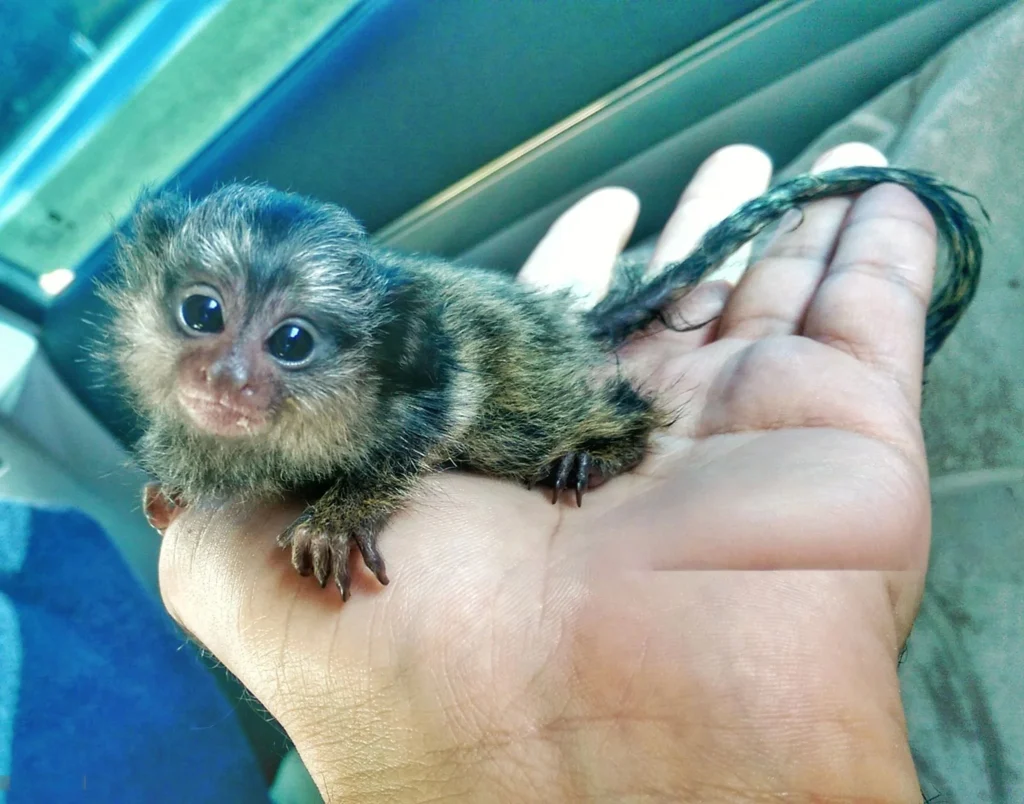
Overall, while people may be attracted to their tiny size, the habitat requirements of a marmoset monkey go far beyond what most homes can reasonably provide. Their housing needs highlight why these primates are better suited to specialized facilities than to typical household environments.
Diet and Feeding Requirements for a Marmoset Monkey
Feeding a marmoset monkey as a pet is one of the most important and challenging aspects of their care. Often marketed as the smallest monkey pet or a “finger monkey,” these tiny primates have very specific dietary needs that are crucial for their health and wellbeing. In the wild, marmosets spend hours foraging for insects, tree sap, fruits, and nectar—foods that provide essential nutrients and support their fast metabolism. Replicating this diet in captivity requires careful planning and attention.
Recommended Foods
To meet their nutritional needs, a marmoset as a pet should be fed a combination of:
- Tree gum or sap: This is a natural staple for marmosets, supporting both dental and digestive health. Acacia gum or specially formulated gum feeders are often used in care programs.
- Specialized primate food: Commercial marmoset or pygmy marmoset chow provides balanced vitamins, minerals, and protein to prevent deficiencies.
- Protein sources: Small insects like crickets or mealworms, and occasional eggs, provide the protein they need for energy and growth.
- Fruits in moderation: Papaya, mango, banana, and blueberries can be offered, but sugar content should be limited to prevent obesity and diabetes.
- Vegetables and greens: Leafy greens, sweet potato, carrots, and zucchini supply important fiber and micronutrients.
- Occasional nuts and seeds: Only in small amounts, as high-fat content can lead to weight gain.
Foods to Avoid
Because of their tiny size and sensitive digestive systems, marmosets have a long list of foods that are toxic or harmful:
- Chocolate and caffeine – affect heart and nervous system function.
- Onions and garlic – can cause anemia and digestive issues.
- Alcohol – even tiny amounts are extremely dangerous.
- Junk food and human snacks – chips, cookies, and processed foods can cause obesity and organ damage.
- Dairy products – most marmosets are lactose intolerant.
- Avocado (skin and pit) – contains persin, toxic to many animals.
- Excess fruit – high sugar content can lead to diabetes and tooth problems.
- Artificial sweeteners like xylitol – can be life-threatening.
Feeding Tips
- Offer frequent small meals throughout the day instead of one large meal.
- Include vitamin D3, calcium, and high-quality protein to maintain bone health and overall growth.
- Avoid sudden diet changes, as they can cause stress and digestive issues.
- Always provide fresh water in a clean, accessible container.

Average Lifespan of Marmosets
One important factor to consider before committing to a marmoset is their lifespan. On average, marmoset monkeys live between 10-16 years with proper care. This long-term commitment means potential owners must be prepared for years of dedicated care and attention.
Medical Care for a Marmoset Pet
Providing proper medical care is essential for the health and longevity of marmosets. These tiny primates are delicate and highly sensitive to stress, diet, and environmental changes, so regular veterinary attention is crucial. Exotic animal veterinarians are best equipped to monitor their health and prevent common illnesses.
Routine Check-Ups
Marmosets benefit from regular veterinary exams, ideally once or twice a year. During these visits, vets can:
- Examine teeth, skin, and overall body condition
- Perform blood work to detect nutritional deficiencies or infections
- Screen for parasites, which can affect both the monkey and household members
- Provide vaccinations or treatments when needed

Common Health Issues
Even with careful care, marmosets are prone to several medical concerns:
- Nutritional deficiencies – imbalanced diets can cause weak bones, dental problems, or metabolic disorders
- Digestive problems – sudden diet changes or unsuitable foods can lead to diarrhea or gut infections
- Respiratory infections – caused by drafts, poor ventilation, or exposure to pathogens
- Stress-related illnesses – boredom, isolation, or lack of social interaction can weaken their immune system
Emergency Signs to Watch For
Immediate veterinary attention is required if a marmoset shows:
- Sudden lethargy or refusal to eat
- Persistent vomiting or diarrhea
- Labored breathing or sneezing
- Unexplained injuries
Even minor health issues can escalate quickly due to their small size, making early intervention vital.
Preventive Care Tips
- Maintain clean and enriched housing to minimize infections
- Provide a balanced diet appropriate for their species
- Avoid stress and exposure to household hazards
- Monitor behavior and weight daily to catch early signs of illness
Do Marmosets Carry Disease?
It’s natural to worry about diseases when introducing an exotic pet to your family. While marmosets can carry diseases transmissible to humans and other animals, responsible care and regular vet checkups minimize the risks.
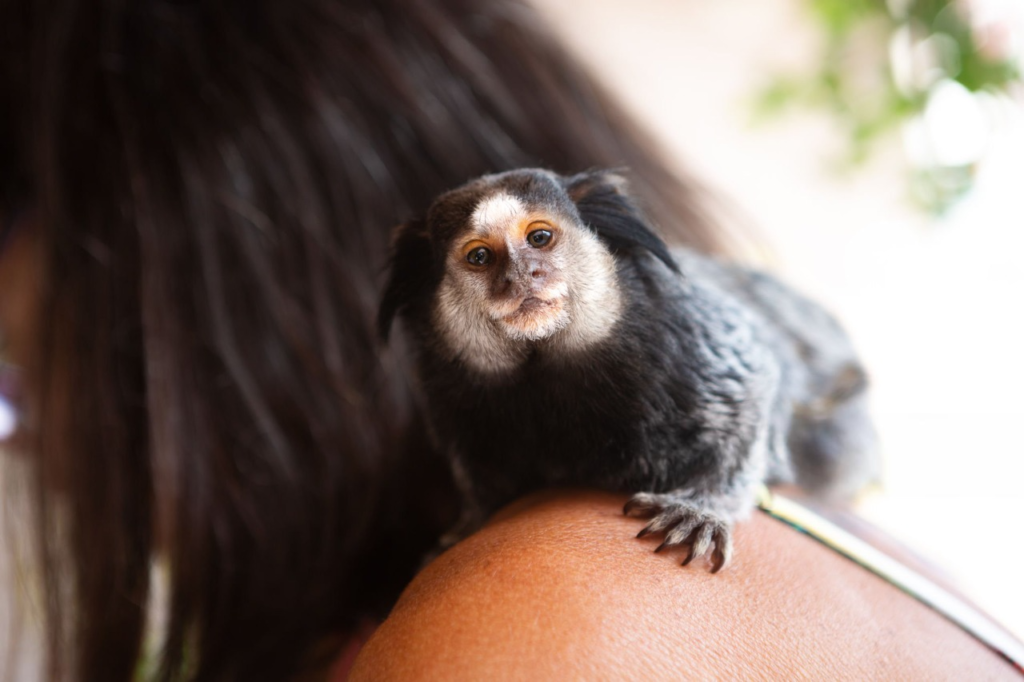
Marmoset Monkey Cost as a pet
Owning a marmoset monkey as a pet is a serious commitment—not just in time and care, but also financially. These tiny primates, sometimes called finger monkeys, require specialized diets, large enclosures, veterinary care, and enrichment to thrive. Prospective owners should understand that the cost of a finger monkey goes far beyond the initial purchase price.
Purchase Price
The price to acquire a marmoset, or finger monkey, can vary significantly depending on the species, age, and source. For example:
- Finger monkey price in the USA typically ranges from $5,000 to $8,000 for a healthy, captive-bred individual.
- The marmoset monkey price can be slightly lower or higher depending on availability and breeder reputation.
It’s important to research licensed breeders if considering a marmoset monkey as a pet. While there are online resources and platforms that list breeders for those searching terms like “buy a finger monkey” or “marmoset monkey cost,” it’s essential to be cautious. Always verify the breeder’s reputation and legal compliance, and remember to factor in the ongoing expenses of proper care
Ongoing Costs
Owning a finger monkey involves continuous financial responsibility, including:
- Specialized diet and supplements: $50–$100 per month. Marmosets require a mix of commercial primate chow, gum, insects, fruits, and vegetables to stay healthy.
- Veterinary care, including exotic animal check-ups and preventive treatments: $200–$500 per year for routine exams, plus vaccinations and parasite screening.
- Housing and enrichment to mimic their natural habitat: $500–$1,500 for a large, secure cage, climbing structures, ropes, and toys. Additional costs for temperature, humidity, and lighting controls may apply.
- Unexpected medical emergencies: $500–$2,000 or more, depending on the severity of illness or injury. Exotic animal specialists often charge higher fees than standard vets.
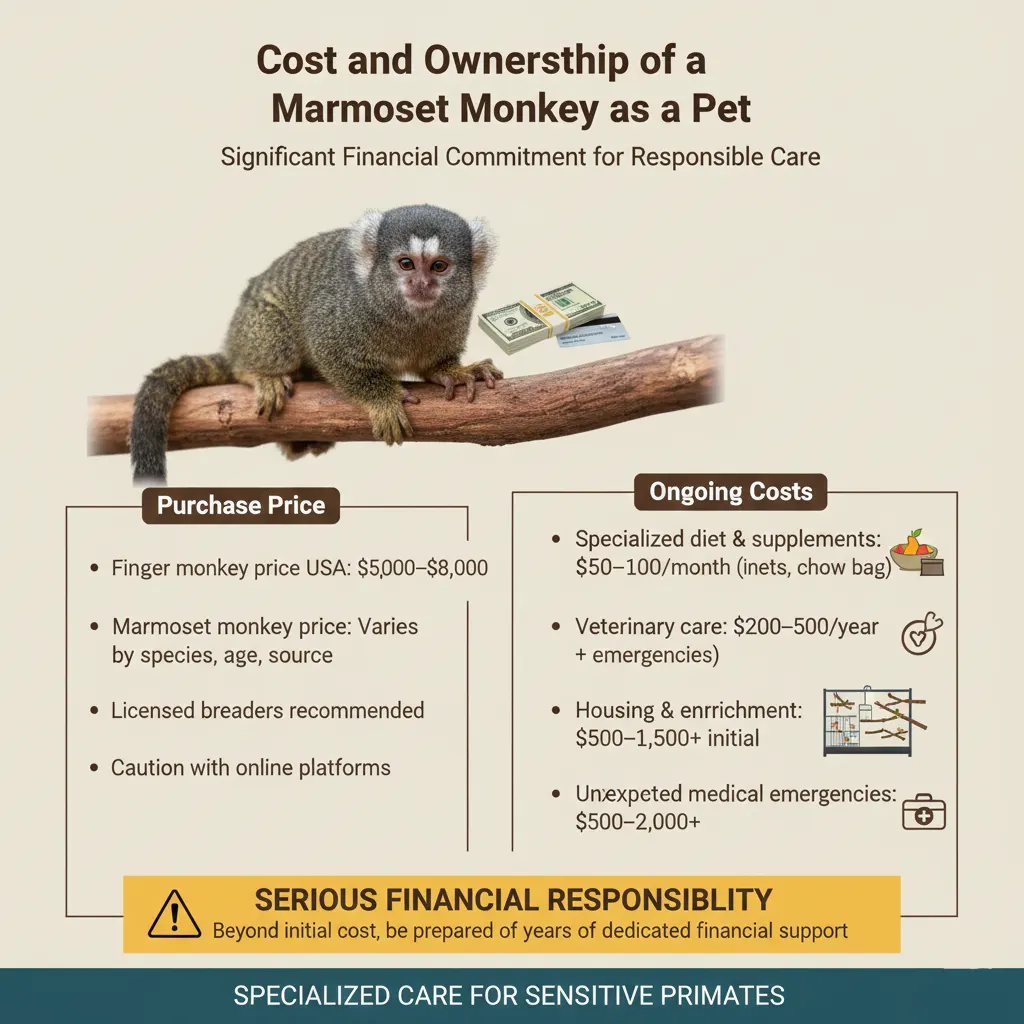
Are Marmosets Good Pets?
Marmosets can make charming and affectionate companions, but they are not traditional pets like cats or dogs. They are highly intelligent, social animals with complex needs. Owning one is similar to caring for a perpetual toddler, requiring constant attention, an enriching environment, and meticulous care. Additionally, their natural behaviors, like screaming or marking their territory with scent, can make them challenging to handle in a domestic setting. Potential owners must ask themselves one critical question: Does a marmoset truly fit my lifestyle?
Pros of Owning a Marmoset Monkey:
- Unique Companionship: Marmosets are highly social and intelligent, making them an intriguing companion for the right owner.
- Cuteness Factor: Their tiny size, expressive faces, and playful demeanor are undeniably appealing.
- Exotic Factor: Marmosets are rare and unique pets, which appeals to those seeking an unusual animal companion. For exotic-pet lovers, species like binturong or sugar glider often come up as alternatives.
Challenges of Owning a Marmoset:
- High Maintenance Needs: Marmosets require constant attention, a specialized diet, frequent grooming, and a suitable habitat.
- Socialization Dependency: They are social creatures that can suffer from loneliness or stress if left alone for extended periods.
- Legal & Ethical Considerations: Owning a marmoset as a pet is illegal in many places, and their care requires strict adherence to ethical standards to ensure their well-being.
Take Action
Thinking about bringing a marmoset into your life? Do your homework, consult an exotic animal specialist, and only purchase from ethical sellers. And remember, what’s best for the marmoset should always come first.

General Facts about Marmoset monkeys as a pet
- Marmoset monkeys are small, social primates that can make unique and entertaining pets.
- They require specialized diets that include fresh fruits and vegetables, protein sources, and supplements for proper nutrition.
- Marmosets also need regular medical care from an exotic animal specialist to prevent illnesses and monitor for any zoonotic diseases they may carry.
- These monkeys thrive on social interaction with both humans and other marmoset companions. Without enough stimulation, they may develop stress-related behaviors.
- Potty training a marmoset is difficult, as they tend to mark their territory with urine. Some owners have had limited success with diapers but it’s hard to eliminate this behavior entirely.
- The legality of owning a marmoset as a pet varies by location, and it’s important to research and understand the laws before considering one as a pet.
- Marmoset monkeys can be expensive pets, with prices ranging from $2,000 to $10,000 depending on factors such as age and breed.
- They can coexist with other pets, but careful introductions and supervision are necessary. Marmosets have been known to carry diseases that can be transmitted to humans and other animals, so regular vet checkups are essential.
What People Are Saying About Marmoset Monkeys as Pets
- Not ideal for most households: Many people agree that marmosets are cute, but they are high-maintenance animals and not suitable for casual pet owners.
- Behavioral challenges: Marmosets can become aggressive or stressed in captivity, mark their territory with urine, and may bite if frightened. Potty training is difficult, and while some use diapers, the behavior is rarely fully eliminated.
- Specialized care required: Owners mention that a proper marmoset monkey as a pet needs a large, enriched enclosure, vertical climbing space, constant social interaction, and a carefully balanced diet.
- Long-term commitment: Marmosets live 10–15 years in captivity, which requires consistent attention, time, and dedication over many years.
- Ethical and emotional concerns: Taking marmosets from wild or poorly regulated breeders can cause stress and emotional harm, since these primates are highly social and intelligent.
- Compatibility with other pets: Cats, dogs, or other household animals may see marmosets as prey. Owners advise supervised interactions and gradual introductions if other pets are present.
- Admiration but caution: Many people admire their tiny size and intelligence, but warn that keeping a marmoset monkey as a pet is complicated and should not be taken lightly.

Tips for prospective owners:
- Only buy from reputable breeders who prioritize welfare.
- Ensure the home environment can meet social, dietary, and habitat needs.
- Budget for specialized diet, veterinary care, and enrichment.
- Understand the emotional and ethical responsibility of keeping a primate as a pet.
If you’re interested in marmoset monkeys but not ready for the responsibilities of owning one, ethical wildlife encounters are a meaningful alternative. Choose sanctuaries, licensed rehabilitation centers, or accredited zoos that prioritize animal welfare and do not encourage harmful breeding or trading practices and be sure to follow the guidelines for ethical wildlife encounters to avoid supporting harmful practices. These interactions allow you to appreciate marmosets without contributing to the demand for unethical exotic-animal ownership.
In Conclusion
Owning a marmoset monkey requires dedication, time, effort, and resources. While these captivating creatures may seem like an irresistible pet choice at first glance, potential owners must do extensive research and carefully consider all
